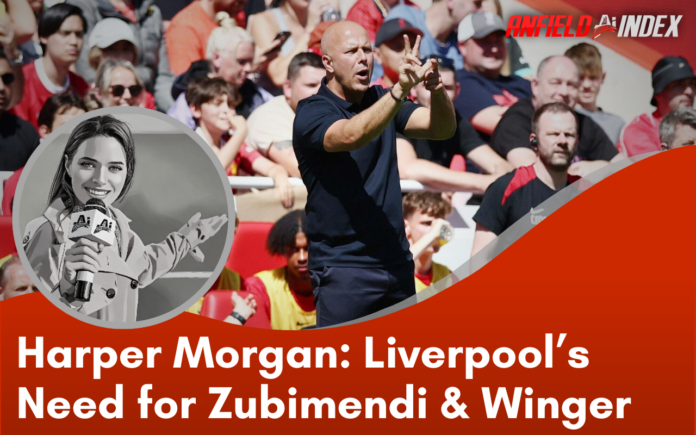Liverpool, Sevilla and Slotball: Tactical Analysis
Liverpool’s recent match against Sevilla provided an insightful glimpse into the tactical intricacies of Slotball, a system that’s rapidly gaining traction. But why are third-man combinations and tempo changes so crucial to this approach? And why are Liverpool reportedly targeting Martin Zubimendi and a new winger to bolster their squad? Let’s delve into the details.
Understanding Slotball: The Tactical Setup
Liverpool started the match with their typical narrow 4-2 build-up, a formation that focuses on compactness rather than width. The fullbacks, rather than stretching the pitch, hold minimal width, effectively pulling the opposition towards the centre. This creates a congested area in the middle of the park, forcing opponents to close down central lanes, which in turn leaves the wide spaces open and vulnerable.

Slotball, as evidenced in Liverpool’s approach, relies heavily on two primary routes to penetrate the final third. These routes, however, demand specialists to truly unlock their potential. The key lies in the tempo changes. Slot’s teams are known for building up play patiently, only to shift gears suddenly into transition mode. This rapid change is designed to catch opponents off guard, aiming to finish attacks with minimal touches.
The Role of Tempo and Specialists
Tempo changes were particularly evident in the build-up to Luis Diaz’s goals in the first half. Liverpool’s ability to transition swiftly, coupled with third-man combinations and deep runs, is a hallmark of Slotball. These elements make Liverpool especially dangerous on the counter, as they can quickly convert a defensive situation into an attacking one.

However, to execute this system effectively, Liverpool require specialists. Firstly, a No. 6 who can thrive under pressure and maintain possession is crucial. Currently, the club has experimented with several players in this role, including Wataru Endo, Ryan Gravenberch, Curtis Jones, Dominik Szoboszlai, Alexis Mac Allister, and Stefan Bajcetic. While many of these players can operate as the second player in a double pivot, the primary No. 6 position remains somewhat unsettled. This is where Zubimendi comes into the picture. His impressive stats—ranking in the top 8% for passing under pressure and top 2% for minimising lost balls—make him an ideal fit for Slotball.

Martín Zubimendi’s Dominance in Defensive Metrics
Martín Zubimendi’s performance in the 2023/2024 Champions League, as analysed by StatsBomb, highlight his defensive prowess. The Real Sociedad midfielder, aged 25, showcases a commanding presence, outperforming the league average across various key metrics.
Ball Recovery and Defensive Actions
One of Zubimendi’s standout attributes is his ability to recover the ball, ranking in the 97th percentile with 11.69 recoveries per 90 minutes. This is significantly above the league average, emphasizing his crucial role in breaking up opposition play. His defensive actions per 90, marked at 17.72, also underline his active involvement in thwarting attacks.

Passing Efficiency Under Pressure
Zubimendi excels not only defensively but also in maintaining possession under pressure. His passing accuracy is an impressive 89%, with a pressured pass success rate of 86%, placing him in the 91st and 81st percentiles, respectively. This demonstrates his composure and technical ability in high-pressure situations.
Overall, Martín Zubimendi’s performance data positions him as one of the top defensive midfielders in the competition. His ability to disrupt opposition play and maintain control under pressure makes him invaluable to Real Sociedad’s campaign.
The Need for Width and the Winger Dilemma
The second critical component of Slotball is width, particularly from a winger capable of taking on fullbacks in one-on-one situations. At Feyenoord, Slot had the likes of Yankuba Minteh and Igor Paixao to fulfil this role. At Liverpool, however, only Luis Diaz currently fits this profile, although he often drifts centrally, which somewhat limits the team’s width.
Slot’s unique version of the transition game differs from Klopp’s traditional methods, yet it holds the potential to unlock Liverpool’s full capabilities. However, to maximise this, another proper winger is needed to hold the width and exploit the spaces left open by the opposition. This addition could be the key to elevating Liverpool’s attacking play to new heights.

Addressing Defensive Weaknesses
Despite the attacking promise, there remains a significant weakness in Liverpool’s off-the-ball play. The transition from a 4-4-2 to a 4-2-4 press has left the wingers caught in a dilemma—should they cover the opposition fullbacks or press the centre-backs? This indecision has led to vulnerabilities that could be exploited by stronger Premier League sides.
For Liverpool to fully realise the potential of Slotball, they must address these tactical gaps. A pressure-resistant No. 6 like Zubimendi and a true winger to hold the width are essential components. By filling these roles, Liverpool could unlock a new dimension to their game, making them a formidable force in the Premier League.



